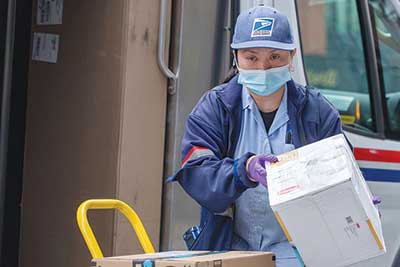Postal Service could end this fall without House-passed pandemic aid package
Republican-controlled Senate, President Trump are calling the aid package ‘Dead on arrival’
By ED FINKELSTEIN
Publisher

The U.S. Postal Service is at a crossroads: the essential public service needs a stimulus to stay afloat, but President Trump and Treasury Secretary Steven Mnuchin have kept it out of their $2.3 trillion CARES Act. The HEROES Act, which now moves to the Senate, would provide a needed $25 billion in financial assistance to the Postal Service. Meanwhile, at the latest count, 12,000 postal workers and letter carriers have been diagnosed with COVID-19 and an estimated 61 workers have died.
While the Postal Service (USPS) provides critical support to Americans – that has been especially true during the coronavirus pandemic – the reduction in mail income during the pandemic has caused a financial crisis that could stop the mail this fall unless Congress appropriates the $25 billion temporary subsidy in the pending $3 trillion HEROES Act. It has passed the House of Representatives but is stalled in the Republican-controlled U.S. Senate.
The emergency plight of the Postal Service and the need for an immediate financial rescue was discussed last week in a conference call organized by the AFL-CIO with the national leaders of the three postal unions, the letter carriers, mail handlers and postal workers. A mail handler from a processing center in Virginia joined them.
“While postal workers across America are trying to do their job in a global pandemic, they are under attack by their own government,” said program moderator, AFL-CIO Secretary-Treasurer Liz Shuler.
HEROES ACT
The Health and Economic Recovery Omnibus Emergency Solutions, or HEROES Act is a broad-range proposal to, among other benefits, provide $1 trillion in emergency funding to state and local governments facing serious revenue shortfalls; establish a $200 billion fund to give essential frontline workers hazard pay; provide a new round of direct payments of up to $6,000 per household, with another one-time check of $1,200 to individuals earning up to $75,000; extend the extra $600 weekly federal unemployment benefit through January 2021 for regular full-time workers, and through March 2021 for gig workers, independent contractors, part-time workers and the self-employed.
It has been passed by the House, but both the Republican-controlled Senate and President Trump have said it’s “dead on arrival.” So much for helping working people.
USING THE PANDEMIC AS COVER TO PRIVATIZE
Using the request for COVID-19 emergency financial aid as an excuse, President Trump and the Republican-controlled Senate are pushing hard for privatization of the service. They falsely claim that because the service is running a deficit it must be poorly managed and should be turned over to a private company, hiding the fact that the federally mandated requirement to pre-pay billions in future health benefits not yet incurred is the key cause of the service’s deficits. Without that requirement, which no other federal or private organization has, the Postal Service would be profitable.

Pointing out that the USPS is totally self-sufficient and doesn’t take a dime of taxpayers’ money, American Postal Workers Union (APWU) President Mark Dimondstein said the emergency funding request is a direct response to the drop in postal volume, and thus revenues, caused by the pandemic. He said the Postal Service could run out of money by this fall, putting the nation’s most highly rated government service in “dire jeopardy.”
“This is a real crisis. Postal workers are dedicated to serving the public, bringing life-saving medicines, pension and stimulus checks, voting information and ballots, and so much more while putting themselves at risk, but they carry on.”
PROVIDING A ‘SENSE OF NORMALCY’
“In this crisis, the Postal Service provides a sense of ‘normalcy’ to all Americans when they get their mail every day,” added National Postal Mail Handlers Union President Paul Hogrogian. But that’s at stake from an administration that’s outright hostile to the Postal Service… (because they) simply want to privatize the service.”
Postal workers, like other essential workers, are putting their lives at risk just doing their jobs, National Association of Letter Carriers Vice President Brian Renfroe said.
At the latest count, 12,000 postal workers and letter carriers have been diagnosed with COVID-19 and an estimated 61 workers have died.
“While services like police, fire fighters, nurses and doctors are rightly recognized for providing essential services, we feel like we’re being ignored. We put our lives on the line everyday just like they do,” said Dwight Burnside, a mail handler from a Virginia distribution center.
DELIVER A MESSAGE TO CONGRESS
How to resolve the issue and get the crisis funding?
Put pressure on your congressman, APWU President Dimondstein stressed. “Call them, write them, let them know how important the Postal Service is to you, to America. Congress needs to step up and take care of the people, their constituents.
“In the last funding bill, corporations got $500 billion in relief, the Postal Service – nothing,” Dimondstein pointed out.
The Postal Workers, Mail Handlers and Letter Carriers unions are playing a major role in protecting their members, Shuler stressed, but the federal government must act to provide funding to ensure this vital service to Americans continues unabated.
“Too much is riding on this essential service,” Shuler stressed. “Congress must act.”



Leave a Reply